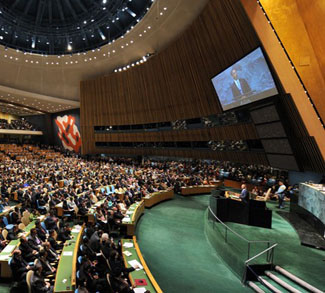The conservative Tea Party movement has made substantial gains in the primaries leading up to November’s mid-term elections. But will it end up costing the Republican Party in the long run?
Tea Party candidates have won the Republican nomination in Delaware, New York, and New Hampshire, sparking fears in the Republican establishment that their activist strain of conservatism will prove unpalatable to the electorate come November. The result in Delaware was so shocking that one Republican strategist remarked, “I’m sad to say the Delaware primary results tonight are straight out of Harry Reid’s dream journal.”
While the Tea Party victories can be taken as a boon for the Democrat Party, it is still likely that they will lose the House come November. Popular discontent with the state of the American economy runs deep, and the public will be out to punish incumbents when given their chance to voice their displeasure at the ballot box.
The November mid-term elections in the United States will undoubtedly cause important international political and economic fallout. Economically, a Republican-dominated Congress could spook investors by giving them the impression that legislative gridlock will foil attempts to reign in the spiraling US deficit. On the political front, President Obama would be forced to switch his focus away from the domestic and towards foreign policy as a way to boost his presidential credentials leading into the 2012 election.
George Friedman speculates that President Obama could use such an onus on foreign policy to enact a high-profile rapprochement with Iran:
“What the settlement with Iran might look like is murky at best. Whether Iran has any interest in such a settlement is murkier still. But if Obama gets hammered in the midterms, his domestic agenda will be frozen. He doesn’t have the personal strength and credibility to run against Congress for two years and then get re-elected. He retains his power in foreign affairs but he has not gotten traction on a multilateral reconstruction of America’s global popularity. He has two wars ongoing, plus a major challenge from Iran. Attacking Iran from the air might or might not work, and it could weaken him politically.”
The BBC has posted an informative cross-section of reactions from the blogosphere. It includes:
“Christine O’Donnell’s surprise victory in the Delaware Senate GOP primary Tuesday left Republicans in conflict, senior party officials openly fretting that the Senate is now out of reach and Democrats overjoyed that the opposition has handed them a late and desperately needed chance to reframe the national argument about the 2010 elections.”
Mark Halperin in Time Magazine:
“You can draw a straight line between the weakness of the Republican Party after Barack Obama’s smashing 2008 victory and Tuesday night’s victory for Christine O’Donnell over Mike Castle in Delaware’s Republican Senate primary. […]
“The activism and patriotism of the Tea Partiers are admirable, but the GOP has put itself at risk long term.”




